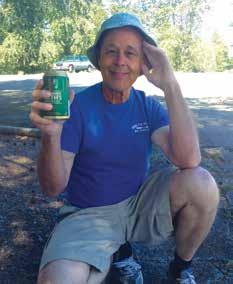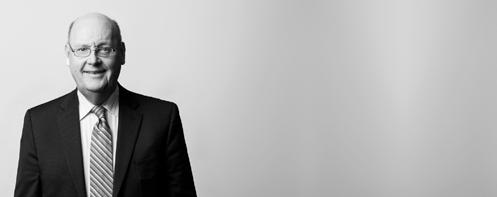
5 minute read
THE PATH TO SUCCESS
The Education of Self
Nigel Atkin
The benefits of an “education” often don’t seem apparent until later in life.
There are many perspectives. Gratitude for the opportunity is one of them. That is usually reserved for parents—those who fomented their child’s vision through their own desires or through their later-in-life lamenting the circumstances where war or other economic realities thwarted their own studies.
In most personal recollections, students cite parents for teaching them the importance of developing life skills and the knowledge of how to have a fuller life beyond just making a living.
In life, I have also met many successful people in business who sense they are “not educated” enough.
Those individuals can simply go back to school and demystify something that has bothered them for most of their adult lives. Training and Education Training involves learning with a goal of performing a specific skill or behaviour. A new industry sometimes develops and jobs are available, but a workforce needs specific technical training, for example, for society to adapt to the economic needs of climate change.
Colleges handle that function well, rapidly modifying course options to serve community and industry needs. Good colleges also provide educational background about the services they offer their students, such as the history of the trades, the context of the key leaders in the field, who built what great bridge, the architectural background, the significance of good design in everything, and so on.
In life, I have also met many successful people in business who sense they are “not educated” enough.
Education by definition is a systematic process of learning something with a goal of acquiring knowledge. Universities are usually considered the home for getting a good education.
They generally teach students to think critically from multiple
©iStockphoto.com/Connel_Design perspectives to create solutions to life’s complex issues. They encourage discussion, research, and engagement to develop communication toward leadership positions that motivate people into action.
They teach business students the organizational and management skills, studies that are transferable in any market, thus rounding out skills to lead people into greater success than just monetary profits.
Some universities teach theology or journalism or indigenous studies. The opportunities in Canadian universities are as wide as the sky and can take any student inclination or developing passion to infinite extremes of comprehension, economy, and self-worth. Knowledge is Power One of the best essays I received from a student in a management course at the University of Victoria a couple of decades ago was an assignment to defend or refute the philosophical concept that “Knowledge is Power.” She wrote that knowledge, even if it is not used, is still power resident in the individual.
I‘ve thought of that idea for many years, how for instance a dam contains water for when and if it’s needed for energy, recreation, or irrigation, even for refueling water bombers in times of fire emergency. Knowledge makes people powerful for when and if it’s needed.
Similarly, I think of subject-matter experts resident within the civil or public services of government, the best qualified and ready to offer complex policy options and law if necessary. Those servants help manage and regulate dire issues of food, drug, and water safety, the looming digital-age issues of surveillance, data ownership, personal privacy, hacking, and other yet-to-be-determined aspects of Information Age war.
Consider how many North American deaths were caused by anti-intellectuals who dismantled institutions to manage global pandemics. In many instances, from halting research and intelligence-gathering to the production of vaccine, many balls were dropped. Other Paths to Education Formal university education is but one of the paths toward ongoing education.
Louis L’Amour was primarily known as a writer of western novels, many of which became television and western movies; we grew up with many of his stories. He also wrote history and science fiction.
One of his books, Education of a Wandering Man, was his memoir, his life as someone who left school at 15 and developed a lifelong affair with learning. The autobiography documents the novels and other books he read, the world he travelled, and the amazing men and women he met along his trail . . . their influence on him as a man and as a great writer and storyteller.
That kind of diversity of living life and gaining knowledge and wisdom by consciously wandering rightfully appeals to many spirited people. Merging Trades and Academics There is also an appeal to merge practical and even supposedly frivolous life studies in art and in “the trades” with classic university education. People who do that have always been intriguing, the best of them deemed of Renaissance stature.
Winston Churchill comes to mind in that regard. He considered laying some 200 bricks in his Chartwell Garden; writing a couple of hundred words and painting a picture was a very good day.
In his essay, first published in 1932 and subsequently after World War II in 1948, “Painting As A Pastime,” Churchill explains the balance needed in life and how stresses, what we today consider burnout, can be mitigated through using completely different parts of our brain at different times.
He explains that when making the right colour choice for a painting, other parts of our brain—those literate or dealing in mathematics—rest, actually healing. The concentration of bricklaying or other trades also balances the mind, just as coming home from a job site one can find a good book calms the fatigue and nerves of the day.
In past decades I have made numerous bootleg copies of my own somewhat rare copy of his essay for students, friends, and many soldiers returning home. Today, Project Gutenberg Canada has made this short e-book freely available to all on the Internet. It is well worth looking up and reading.
In a similar circumstance of balancing college and university, a career counsellor at Camosun College on Vancouver Island told me that students right out of high school have told her they want to be doctors. She advised them to learn welding first because that trade will help them pay for medical school, and at the same time, improve their hand/eye coordination for the delicate surgery ahead.
The blending of trades and the more standard education is supported on numerous other fronts.
An Irish author/philosopher specializing in organizational behaviour, Charles Handy presented his views on the nine different kinds of intelligence in a book called The Empty Raincoat in the UK and The Age of Paradox in North America.
He explains them as Factual, Analytical, Linguistic, Spatial, Musical, Practical, Physical, Intuitive, and Interpersonal. While he contends there may be more, he makes a case for knowing which one, or how many, actually reside in each of us.
While life might be the primary teacher for all of us, the journey is made easier and life better when we explore ourselves and nurture our innate intelligence(s) in the wide possibilities offered through experience, universities, colleges, and art schools. s Nigel Atkin teaches the Evolution of Public Relations course online at UVic. He offers onsite communication workshops to leverage human capital and exploit the multiplier effect of becoming better communicators.








